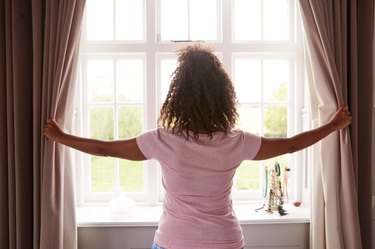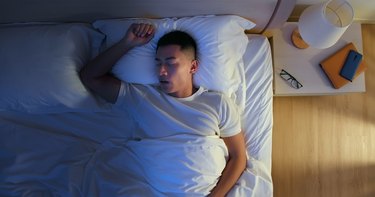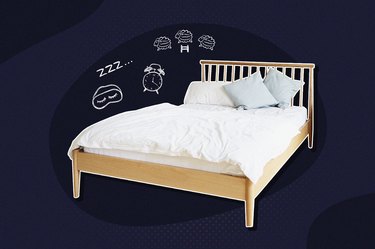
When you think resolution, you naturally might think about diet or exercise goals. But you should add "get better sleep" to that list.
"Sleep is essential for health. We need to allow ourselves enough time to get quality sleep," Brendan Lucey, MD, head of the Washington University Sleep Center, tells LIVESTRONG.com. "Data shows that disrupted sleep is associated with numerous medical problems, from high blood pressure, heart attacks and strokes to risk factors for Alzheimer's disease," he says.
Video of the Day
Video of the Day
That's why prioritizing sleep as something is so vital for your wellbeing in 2023. They say "New Year, New You"— and good sleep habits definitely make you feel like a new person. Here's what you need to do:
1. Get (at Least) 7 Hours of Sleep at Night
That's the amount of sleep that the American Academy of Sleep Medicine (AASM) recommends adults get every night.
"There's good evidence that getting less than that not only makes you feel sleepy and fatigued, but also, over time, increases the risk of cardiovascular disease and diabetes, as well as poorer immune function," says James A Rowley, MD, professor of pulmonary and critical care and sleep medicine at Wayne State University and president-elect of AASM.
There are both physiological reasons (such as inflammation) and behavioral ones (such as food intake) that connect insufficient sleep with diabetes, per a November 2016 review published in Current Diabetes Reports. And, both sleeping too little (under seven hours) and too much (over nine hours) are associated with an increase in overall cardiovascular disease mortality, according to a December 2019 systematic review and meta-analysis in European Heart Journal - Acute Cardiovascular Care.
Sleeping more is the change that will make the biggest impact on your wellbeing — but, of course, you have to carve out the time and actually get yourself to go to bed. More on that below.
2. Keep Your Laptop Out of Your Bed
It's tempting to tote your laptop in your bed where it's warm and cozy and you can relax … while fitting in extra work time.
"It's easy to get lost in doing things and stay up later than intended," Dr. Rowley says.
If possible, stop work one hour before bed and do something relaxing. That has to be something that you actually enjoy, or you're not going to leave your inbox to do it. Consider stretching, reading a book, taking a shower or even watching a lighthearted show on TV.
For Dr. Rowley, his relaxation time includes Wordle and the New York Times Spelling Bee. Both are on his phone (that's OK, really, as long as it's built into your relaxation time and not used as a way to procrastinate on sleep), but when they're done, he's done and the phone goes down.
3. Set a Caffeine Cut-Off Time
"Caffeine lingers in the body for quite some time — upwards of four to six hours," says Kenneth Lee, MD, board-certified neurologist at the University of Chicago Medicine. That means if bedtime is at 10 o'clock, a 4 p.m. latte can really derail your rest.
He recommends maintaining a caffeine cut-off time between 1 to 2 p.m. If you crave the perk from an afternoon cup, a short walk has been found to be more energizing compared to a small amount of caffeine, per a small May 2017 study published in Physiology & Behavior. (Here are more strategies to help cut back on caffeine.)
4. Wean Yourself Off Naps
Longer naps during the day make it harder to fall asleep at night, which can set you up for a bad cycle where you, once again, need to take a nap to make it through the day, Dr. Lee says. (And repeat)
"Avoid napping entirely, if possible. If you absolutely must, take a 15- to 20-minute catnap," he says. Set the alarm on your phone when you lay down so you don't accidentally oversleep (here are other napping mistakes to avoid).
5. Open Your Blinds
What you do during the day matters for how you sleep later. Light exposure is one of those factors.
"Consistent light exposure around the same time in the morning will enforce your ability to fall asleep at night," Dr. Rowley says.
Go outside for a brisk walk or sit outside while you have a cup of coffee or tea. Open your shades in your home. If it's wintertime and you live in a Northern climate, the morning light can be tough to come by, especially if you start work early. In that case, at least turn on the lights in the morning.
Another option, Dr. Lee says, is to use a 10,000-lux light box for 30 minutes in the morning. Stand three to four feet away so that you're getting ambient (not direct) light.
6. Reduce Your Alcohol Consumption
A late-night beverage might make you drowsy, but they end up being detrimental to sleep.
"Alcohol is a sedative, but drinking after 6 p.m. is not conducive to a good night's sleep," Dr. Rowley says. "The sedative effect of alcohol wears off, so you wake up at night. It's also a diuretic, so you may also have to get up to urinate," he says.
If you drink, a happy hour sip is a better option than a nightcap.
7. Set Aside a Worry Time
If you find that it's tough to get to sleep because your mind tends to spiral into worry season or "a long list of my to-dos" when things are calm and quiet, it's time to resolve to get those thoughts out of your head before you go to bed.
"Before your bedtime routine starts, think about what you have to do tomorrow and plan out your day or think about existing worries so that it's addressed and you don't have to think about it before sleep," Dr. Lucey says.
If you notice those thoughts come back when you are lying in bed, he recommends "watching them go by like a ticker tape." Maintain a non-judgmental attitude about them (in other words, you're not doing something wrong if these thoughts pop up) and focus on something pleasant instead.
8. Stay Consistent
With varying schedules, it can be tough to keep a consistent bedtime and wake-up time, but this year, prioritize making that happen.
"There's good evidence that if a person sleeps seven hours per night at the same time, they are more awake and alert compared to someone who gets seven hours but varies their sleep time," Dr. Rowley says.
It doesn't have to be on-the-dot perfection, but try to keep your bed and wake time within the same 30-minute window, both on weekends and weekdays.
- Current Diabetes Reports: “Sleep Duration and Diabetes Risk: Population Trends and Potential Mechanisms”
- Physiology & Behavior: “Stair walking is more energizing than low dose caffeine in sleep deprived young women”
- European Heart Journal - Acute Cardiovascular Care: "Association between short and long sleep durations and cardiovascular outcomes: a systematic review and meta-analysis"
Was this article helpful?
150 Characters Max
0/150
Thank you for sharing!
Thank you for your feedback!
Is this an emergency? If you are experiencing serious medical symptoms, please see the National Library of Medicine’s list of signs you need emergency medical attention or call 911.





